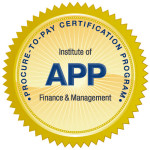
- Membership
- Certification
- Events
- Community
- About
- Help
Automation is revolutionizing the way we approach AP, but implementing it successfully requires careful planning and a collaborative team. Rowena Froegel offers her expertise on how to embark on this journey, providing invaluable advice on fostering a positive attitude towards change and ensuring your team embraces automation with enthusiasm. You’ll gain insights into effective strategies for your team to inspire a love for change within your organization, transforming fear into excitement and innovation.

Rowena Froegel
Senior Manager, Accounts Payable, Discover Financial
Rowena Froegel is a Senior Manager in the Accounts Payable department at Discover Financial located in Riverwoods, Illinois. In this role, Rowena oversees all day-to-day AP operations relating to vendor and employee expenses and disbursements as well as compliance activities for Discover Financial. She has over 20 years of progressive AP experience demonstrating a consistent track record of process improvements as an AP manager in various financial institutions. Rowena has a strong background in all areas of Payables operations, such as Invoice Processing, Vendor File Management, Employee Travel and Expense reimbursement as well as regulatory and compliance activities. Rowena graduated with a B.A. in Marketing from DePaul University and has been APM certified since 2007, and recently added APPM in 2021.

Royce Grayson Morse
Royce Grayson Morse has been working with IOFM for the past eight years, writing and editing content about Accounts Payable, Accounts Receivable, automation, and industry trends. She has worked on the IOFM Certification Guides and written the associated examinations; edits the annual 1099 and 1042 Master Guides; conducts podcasts; and manages the IOFM.com website content.
Grace Chlosta: Welcome to the IOFM podcast. This is a podcast for accounts payable and accounts receivable professionals who want to stay in the know with current AP and AR trends and ideas. We'll be interviewing professionals in this space on a wide variety of subjects, including automation, artificial intelligence, career growth, compliance, leadership, and much more.
Today we'll be interviewing Rowena Froegal. Rowena is a Senior Manager in the Accounts payable Department at Discover Financial, located in Riverwoods, Illinois. In this role, Rowena oversees all day-to-day accounts payable operations relating to vendor and employee expenses and disbursements, as well as compliance activities for Discover Financial. She has over 20 years of progressive accounts payable experience, demonstrating a consistent track record of process improvements as an AP manager in various financial institutions.
00:01:01
Rowena has a strong background in all areas of payables operations, such as invoice processing, vendor file management, employee travel and expense reimbursement, as well as related regulatory and compliance activities.
Rowena graduated with a BA in Marketing from DePaul University and has been Accounts Payable Manager Certified (APM) since 2007, and recently added a P2P certification (APPM) in 2021. Today, she'll be interviewed by Royce Grayson Morse, Managing Editor at IOFM. Royce Grayson Morse has been working with IOFM for the past nine years, writing and editing content about AP, AR, automation, and industry trends. She's worked on the IOFM Certification Guides and written the associated examinations, edits the annual 1099 and 1042 Master Guides, conducts podcasts, and manages the IOFM.com website content.
00:01:55
Royce Morse: Hi, Rowena, and welcome to the podcast.
Rowena Froegal: Hello.
Royce Morse: Hi, how are you doing today?
Rowena Froegal: Doing well. How are you?
Royce Morse: I'm doing okay. So I'm interested to talk with you today about change management within a team. I know that you've gone through a lot of that personally, and I was wanting to kind of explore a little bit with you what that experience was like, how you managed your way through it, and if you have any tips and tricks for folks that are listening to this podcast, particularly as it applies to automation or reorganization, or whatever it might be, that kind of fundamentally upsets the apple cart within the team.
00:02:48
We know that if folks have been doing something for a long time in a certain way, it's really hard for some people to change, and they get scared, they get resistant. So that's kind of what I wanted to explore with you today, since you've been through this a few times. This is not your first rodeo, right?
Rowena Froegal: Correct.
Royce Morse: Okay. So let's talk about your past experiences. Tell me a little bit about what kind of change you were dealing with and what challenges you had with your team.
Rowena Froegal: Sure. As a manager for an accounts payable team, I see adapting to change kind of from two different perspectives or lenses. One is: How do you work with your team, enforcing or having your team accept change? And then also as kind of a person, how do I also adapt to change?
00:03:56
There's kind of two different perspectives that I wanted to call out here.
Royce Morse: That's a really excellent point. I think a lot of folk are just going to assume that the problem with the change and the difficulty adapting to it is going to come from the team, but you have to adapt to it, too, and you have to be prepared to help them manage through it, so it's kind of a two-pronged problem for you, whereas it isn't as complicated for the folks that report up to you. Tell me how you approach it. Well, tell me first: What was your first experience with a major change that you had to implement, and what was your thinking at the time?
00:04:46
Rowena Froegal: Yeah. So there's also – with change, there's two different types of changes in my mind. One is the most common, where you aren't kind of expecting the change and it's kind of brought onto you, and the other one is you initiating a change, a process change or a procedure change. So there's two different types, but I think the ones that [are] really more effecting people are the ones that are unexpected, right? So when you have enough unexpected change, as a person, basically – and this is with anybody – you find yourself tensing up and you kind of start thinking about the negatives of this change, since it's just kind of brought onto you.
One of the things that I've kind of thought about is: Just stop and give yourself a chance to absorb the information and really think about it before reacting. If you're in that kind of mindset, it's kind of hard to accept change when you're already thinking, "I can't do this" or "this is not going to work." That's kind of one of the things that I do myself, personally, with changes.
00:06:03
But as far as past change situations, one example would be, let's say, a technology change. There's different ways for anyone to think about this, but number one: Think of it as an opportunity to improve or learn. You get exposure to new technology. You may even get exposure to best practices across the industry. So that's one way of looking at it. Another way is maybe being open to adjusting your current process. Get out of that mindset of "It's always been done this way. Why do we have to change?" Kind of looking at your processes and being open to that.
00:06:49
And then when you're dealing with technology, it's not always a one box kind of fits all situation, but in the accounts payable space, basically, what we do is we pay invoices, right? But there are little nuances within the process, or different subprocesses, that are embedded within the AP process. But one of the more important things is, when you are implementing technology, to utilize more of the out-of-the-box functionality instead of making customizations. Customizations take a lot of work. They require maintenance, especially when you have regular systematic maintenance updates. You have to make sure that your customizations work with those changes. It tends to be a little bit difficult.
Royce Morse: That makes a lot of sense. Don't overcomplicate things from the get-go, right? You made a point a minute ago that I thought was especially poignant. You said something about change can come from within – for example, you might make a recommendation about some sort of a process or software change – but sometimes it gets handed to you and you don't have a whole lot of input on it.
00:08:13
I think that mindset, that perspective, is translatable to the people that report up to you. If you just decide: Here I am. I'm Rowena. I'm going to make a big change, and everybody else is just going to have to go along with it – versus you talking to them and saying, "This is what I think. Let's sit down and have a chat about it. Let's look into it together. Let's agree that this is the best possible solution." That's a whole different experience, right? Whether you're being mandated to do it a certain way that you didn't have any input to versus you have a say in the matter. I think that probably makes a whole lot of difference in terms of the level of agreement and the level of acceptance that you get with the change. Would you agree with that?
00:09:02
Rowena Froegal: Oh, yeah, absolutely. When there is a change – again, whether it's brought upon you as a manager or you are the one kind of initiating change within your team, having your team engaged or keeping them engaged is very crucial in the process. One, involve them as much as you can throughout the process so that they can understand it. The understanding is key, instead of you just kind of hand them a process and they're like, "Okay, we're going to do this," but they don't understand it. Making sure that they're involved and engaged is important, especially if they're ultimately going to be the people that are responsible for that process.
00:09:56
Royce Morse: Right. And if you end up in a situation where you're getting handed a mandate from above you that, okay, this is the change that we're going to make, then you have to kind of play catchup a little bit, right, and engage them kind of after the decision is already made versus them being participants in the decision before it's made.
Rowena Froegal: Yeah. And as a manager, I make sure that I have all the facts, that I understand all the facts, and that I am (as best as I can) prepared to speak to my team about this change.
Royce Morse: Yeah, I think that's a good point: education yourself because they'll probably have questions or they'll be worried. Have you had folks come to you in the past and say, "I'm really concerned about this. I don't know about this. I'm not feeling good about it"?
00:10:55
Rowena Froegal: Yeah. And one of the important things, right, is that communication. That is key. You want to encourage your team to ask questions and provide feedback. Even though the change was, let's say, coming from above, or if I initiate the change, as a manager, you may not see, or you may be missing something that only they can see. Again, you don't necessarily do the day-to-day, right? You're managing your team, and they do the day-to-day. So it's important for them to, again, be aware of it, but then also encourage them to ask questions and provide feedback so that, as a manager, you can also make the right decisions going forward.
00:11:47
Royce Morse: That's a really good point. They may think of things that you never would have, just because you're not in the trenches with them, and they're going to figure out that there's going to be a problem doing this particular task just because whatever the change is, is not compatible with the way it's been done, and then you're going to have to figure out how you're going to deal with that, whether it might be through a workaround or changing your process or whatever it might be.
Rowena Froegal: Yeah, especially with system testing. Maybe there is inherently something wrong with the system that you're implementing that you didn't see. So that's, again, very important to have that open dialogue and communication with your team as you're going through the process.
Royce Morse: Yeah. I think the point you're making, which is really significant, is that it's not – you're not soliciting their input just to placate them, to make them feel like they're important. It's not a ruse. It's not a sham. It's real because you really need them to tell you if there's going to be a problem before you get to that stage, right? You actually really do need their input, and so I think, as a manager, is super important that you would communicate that. "I've got to know what you think."
00:13:11
Rowena Froegal: Right, exactly.
Royce Morse: So what has your experience been? Have you had bumps in the road along the way?
Rowena Froegal: Yeah. There's been some bumps where maybe one of my employees would come up to me and say, "I don't agree with that." That's a perfectly valid point. One of the things that I like to do is I would ask questions back to them as to: "Okay, why do you think this doesn't work? Give me more facts as to why this process doesn't work or you don't agree with something."
00:13:56
Again, I need more information in order for me to be able to maybe rebut what you're saying to me or maybe give you a better definition or something of what we're trying to do so that you can understand. It's a dialogue. It's back and forth. It's not just them coming to me and saying, "Hey, there's a problem," and then it kind of ends with me. It has to be a back and forth dialogue.
Royce Morse: That's a good point. Not only do you not just want to say – from on high – "Well, I'm telling you to do it, so you have to go do it now. Just deal with it." But, also, they can help solve the problem that they have brought, so you don't actually have to do all of that yourself. Assuming that you don't know every little nuance of everything that they do, you need their help, right?
00:14:57
Rowena Froegal: Yeah, definitely.
Royce Morse: So what strategies have you employed in the past to get them on board or encourage and solicit their feedback? How do you approach it?
Rowena Froegal: One of the things to do as you're going through an implementation is keeping your team informed. This is a good way to keep them engaged and hopefully acceptable [sic] to the change that is occurring. Also, let your team know that this is a learning and development opportunity for them. So it's not only like for the company that, "Hey, we're making this change," but kind of flipping it around on them and saying, "Hey, you have something that you can benefit out of this. You can learn and obtain new skills." Whether they're soft skills, like project management or something, or even technical skills, this allows them to build their wheelhouse of experience and knowledge.
00:16:05
Really, it's important to be adaptable for anyone to be successful and kind of reach their full potential.
Royce Morse: Yeah, absolutely. And I think that's a good point. You're not just doing something for the company. You're actually doing something for yourself. You're learning something that you can employ either here or somewhere else at some point, and knowing more is always a better thing.
Have you had a situation where somebody just flat outright refused to make that change? They just couldn't cope with it or didn't want to?
00:16:47
Rowena Froegal: I think, for the most part, as long as you keep that open communication with your employee, just that dialogue will help them understand. But I guess, as a manager, too, I have to be flexible in a sense that if it is something that I can control and it makes sense for us to change, I will do what I can to make that work. But if it is like a system where the system just won't do it, obviously, you're going to have to go back to them and say, "Hey, the system won't do this, but let's think of a better way to handle that." I hate to say manual process. "What can we do right not to kind of make it right, kind of get to that mutual understanding, and then go from there?"
Royce Morse: Yeah, kind of develop a workaround if you have to, which isn't ideal, but I'm imagining that sometimes it's just inevitable.
00:18:02
Any final tips you have for somebody who's in a management role who's just thrown into some sort of a major change, like a software implementation, or even something like a reorganization, something significant that you didn't maybe have a lot of input to yourself? What are your tips for people who are listening who might find themselves in that situation?
Rowena Froegal: That's a good point about employees, too. There are the technological changes, but there is – as a manager, having to deal with employee changes, like in terms of turnover or employees leaving – because that's also kind of a big change. A couple of points with that.
00:18:53
It's always sad to see someone go, but, obviously, that's their decision. As a manager, one of the things to think about this is that, number one, you give the opportunity for others on your team to develop and learn. Any employees that are remaining, they can potentially be moved into that open position, maybe even a potential for a promotion for that person. That's one thing with employee changes.
Also, too, with employee changes, you can also try to find efficiencies that may be gained with that employee change. Maybe you can revisit your processes. Someone may have been doing this process forever, and this is what they've always done. And maybe, as a manager, you're not quite aware that they're doing this and really it doesn't need to be done anymore.
00:19:51
So you can kind of find those efficiencies by maybe eliminating outdated processes and maybe even just revisiting that as a whole. There are some opportunities there. It's not always bad that someone is going to leave your organization, but there are things that you can get out of that as well.
Royce Morse: Great point. And yeah, it happens, where a reorg will cause people to leave, or you're doing offshoring or something like that. But I think you make a good point that there is also good that can come from that as well. Folks can move on with their careers and you can uncover some inefficiencies and some problems that you didn't even know were there, just because people had been doing something the same way for a really long time, and you didn't know about it. So I think there's a lot of potential benefit there. You just have to try to stay positive, right?
00:20:59
Rowena Froegal: Right, exactly.
Royce Morse: Well, thank you so much. I've enjoyed our conversation. I think it's helpful to hear that others have been through this and that there is light at the end of the tunnel. It's a process that can not only be managed, but it can also be managed for the benefit of not just the organization but for the people that work at it, too. Thank you so much.
Rowena Froegal: You're welcome.
Grace Chlosta: Thank you so much for listening to the IOFM podcast. Remember to head on over to the Member Forum to discuss today's episode and provide ideas for our next one. And to stay up to date on IOFM's current events, both in-person and virtually, head on over to IOFM.com.
Continuing Education Credits available:
Receive 1 CEU per hour of listening time towards IOFM programs:

 Receive 1 CEU per hour of listening time towards maintaining any AP and P2P related program through IOFM! These programs are designed to establish standards for the profession and recognize accounts payable and procure-to-pay professionals who, by possessing related work experience and passing a comprehensive exam, have met stringent requirements for mastering the financial operations body of knowledge.
Receive 1 CEU per hour of listening time towards maintaining any AP and P2P related program through IOFM! These programs are designed to establish standards for the profession and recognize accounts payable and procure-to-pay professionals who, by possessing related work experience and passing a comprehensive exam, have met stringent requirements for mastering the financial operations body of knowledge.
Continuing Education Credits available:
Receive 1 CEU per hour of listening time towards IOFM programs:

 Receive 1 CEU per hour of listening time towards maintaining any AP and P2P related program through IOFM! These programs are designed to establish standards for the profession and recognize accounts payable and procure-to-pay professionals who, by possessing related work experience and passing a comprehensive exam, have met stringent requirements for mastering the financial operations body of knowledge.
Receive 1 CEU per hour of listening time towards maintaining any AP and P2P related program through IOFM! These programs are designed to establish standards for the profession and recognize accounts payable and procure-to-pay professionals who, by possessing related work experience and passing a comprehensive exam, have met stringent requirements for mastering the financial operations body of knowledge.
What are you waiting for?
